California indoor mask mandate to end for the vaccinated Feb. 15
Monday, February 7th, 2022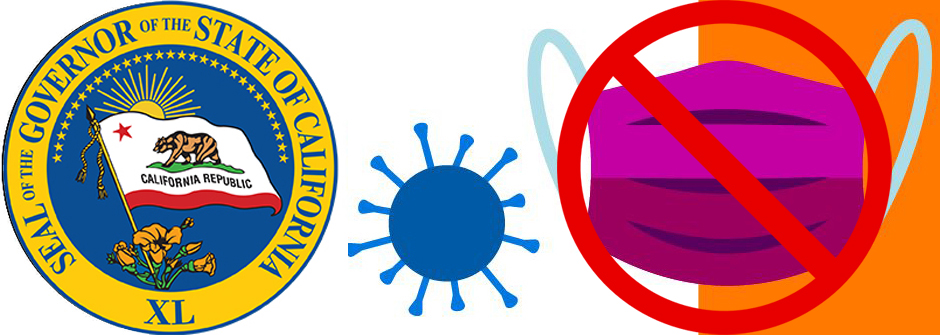


Photo source: CDC
With 80% of all county residents now fully vaccinated, Contra Costa Health Services (CCHS) on Friday, Feb. 4, 2022, lifted its health order requiring certain businesses, including restaurants, gyms, bars and theaters, to verify the vaccination status or recent negative test results of customers. So, there is no longer a need to show your papers at those businesses. (For details see the Rescinding Order)
Although neither former county Health Officer Dr. Chris Farnitano nor county health staff could ever provide documentation showing the percentage of COVID cases in the county from patrons of restaurants, bars, gyms or theaters, he issued an order as of Sept. 22, 2021 requiring those businesses to verify that indoor customers were fully vaccinated, or had tested negative for COVID-19 within the previous three days. His order also included a requirement for workers in indoor areas of those businesses to show proof of full vaccination or test weekly. (See related article)
Farnitano is retiring from his position, next month and Contra Costa County Director of Public Health Dr. Ori Tzvieli is now serving as acting county health officer, as part of the transition.
Testing data show COVID-19 transmission, fueled by the highly contagious omicron variant, remains high in Contra Costa, but that the average daily number of new cases have likely peaked, and countywide hospitalizations due to COVID-19 have also begun to decline.
“We believe now is the right time to loosen a requirement that made a lot of sense last summer, when a different variant of COVID-19 was dominant and there was less community immunity,” said Dr. Ori Tzvieli, acting Contra Costa County Health Officer. “But by no means are we back to normal. There are still many more cases of COVID-19 in our community now than there were in mid-December, so we need to continue to take precautions when we go out.”
The best protection against COVID-19 infections, and serious illness from infections, is to be fully vaccinated and up to date with a booster dose whenever eligible.
“We deeply appreciate everyone who has chosen to vaccinate. You have made yourselves, your loved ones, and the entire community safer,” Contra Costa Health Director Anna Roth said. “If you are eligible and you have not gotten your booster, it is really important that you get one. People who get boosted are significantly safer from serious COVID-19.”
County data show that the daily COVID-19 case rate for Contra Costa residents who received booster doses is more than three times lower than that of unvaccinated people, and about nine times more effective at preventing hospitalization due to the virus.
On Thursday, Contra Costa reached a new milestone, with 80% of all county residents now fully vaccinated. So far, 48.4% of eligible residents have received booster doses.
The verification order, which took effect last September, applied to businesses where people remove face coverings to eat or drink indoors, such as restaurants, bars and entertainment venues, and to gyms and other indoor fitness facilities, including yoga and dance studios, where patrons breathe more heavily due to exercise.
The order required these businesses to verify that indoor customers were fully vaccinated, or had tested negative for COVID-19 within the past three days. It also included a requirement for workers in indoor areas of these businesses to show proof of full vaccination or test weekly.
Though the county requirement may be lifted, private businesses may choose to implement their own verification requirements to better protect customers and staff, and CCHS encourages them to consider doing so as a safest practice during the pandemic.
Other state and countywide health orders remain in effect, including workplace vaccine verification requirements for healthcare workers, first responders and congregate care workers, and a requirement for most people to wear face coverings in most indoor public spaces.
Current state health orders still require proof of vaccination or a recent, negative test result in certain situations, including when visiting hospitals or long-term care facilities, or attending indoor “mega events” of 500 or more people.
Visit cchealth.org/coronavirus for updates regarding Contra Costa County health orders and the county’s emergency response to the COVID-19 pandemic.
Allen Payton contributed to this report.

WHEN: 4 to 5:30 p.m. Wednesday, January 12, 2022
WHERE: The A3 Community Crisis Initiative Event will be held via Zoom. Everyone is welcome to attend and participate using this link. The event will also be broadcast on Contra Costa TV.
Contra Costa Health Services (CCHS), civic leaders and community advocates will deliver an online community update about Anyone, Anywhere, Anytime (A3), a new system for delivering safe, appropriate care to county residents who are experiencing behavioral health emergencies.
A3, developed in partnership with local government, first responders, mental health advocates, patients and families, will be implemented with funds from Contra Costa County’s Measure X sales tax. The program is intended to connect people in crisis with the care they need in the moment, and reduce intervention by local law enforcement where clinical expertise is more appropriate.
“Our community recognized an unmet health need and has come together in an unprecedented way,” Contra Costa Health Director Anna Roth said. “When fully implemented, A3 will ensure that everyone in our community can receive culturally and clinically appropriate crisis services whenever help is requested because of a behavioral health emergency.”
A3, currently a pilot program, will expand into a 24-hour service over the next 18 months that sends crisis response teams including behavioral health professionals directly to behavioral health emergency calls, in coordination with other first responders.
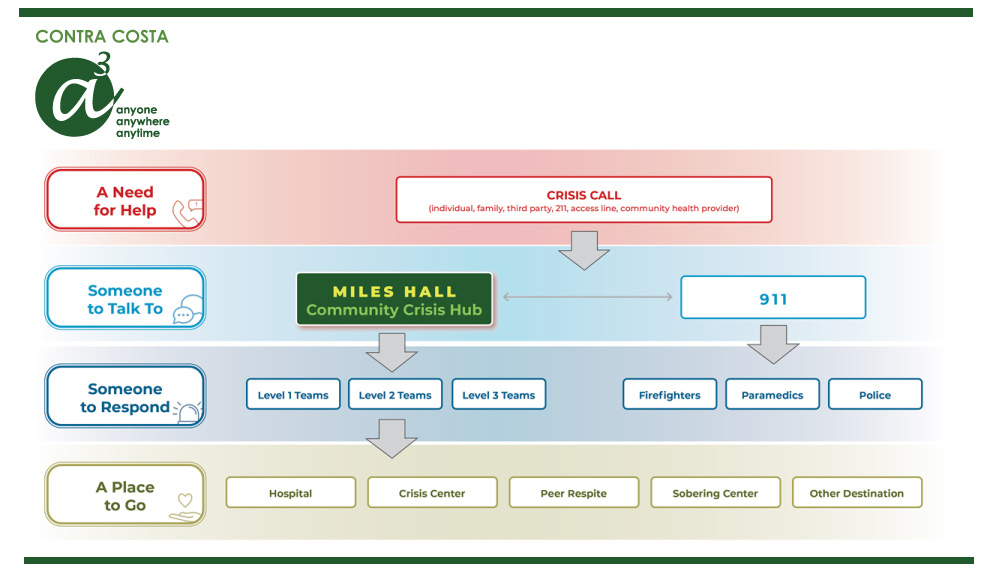
Source: CC Health Services
The service will be accessed through 911 and the Miles Hall Community Crisis Hub, a call center staffed by clinicians from CCHS who can triage calls, determine appropriate responses and dispatch crisis response teams. It is the central component of the model. Miles Hall was a local youth who was tragically killed by police while experiencing a mental health crisis in 2019 during a law enforcement encounter.
CCHS is now developing and hiring staff for the program, supported by a one-time allocation of $5 million in Measure X funds for infrastructure, and $20 million in ongoing funds to support operation of the program, including staffing. Rep. Mark DeSaulnier also submitted two requests for Community Project Funding for behavioral health in Contra Costa County. If approved, more than $2 million in federal funding would be used to expand these services.
Information about A3 can be found at https://cchealth.org/bhs/crisis-response/. This website will be updated throughout 2022.
People experiencing a behavioral health crisis or anyone who needs to obtain help for others can currently access services by calling 911, 211, or our mobile crisis response at 1-833-433-2672.
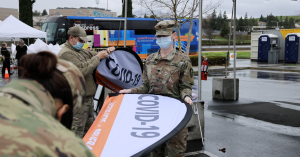
California National Guard personnel arrive at the Antioch Community Center testing site on Saturday, Jan. 8, 2022. Photo: Office of Governor Gavin Newsom
SACRAMENTO – Governor Gavin Newsom announced on Friday that he had activated the California National Guard to support local communities with additional testing facilities and capacity amid the national surge in COVID-19 cases driven by the Omicron variant. The California National Guard is part of the National Guard of the United States, a dual federal-state military reserve force. The CA National Guard has three components: the CA Army National Guard, CA Air National Guard, and CA State Guard.
According to their website, the California National Guard is “a community-based land force maintained at the optimum level of preparedness and readiness for service to the state and nation” that “organizes, trains, equips, and resources community-based land forces. On order, mobilizes to support state and/or federal authority.”
Under the control of the governor, National Guard functions range from limited actions during non-emergency situations to full scale law enforcement of martial law.
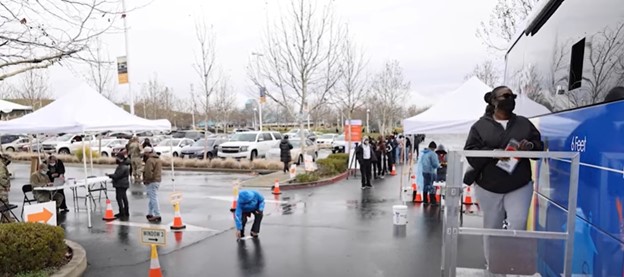
Residents stand in line in Antioch for a COVID test on Saturday, Jan. 8, 2022. Video screenshot. Source: Office of Governor Newsom
“California has led the country’s fight against COVID-19, implementing first-in-the-nation public health measures that have helped save tens of thousands of lives,” said Governor Newsom. “We continue to support communities in their response to COVID by bolstering testing capacity.”
The announcement comes as Omicron continues to spread rapidly across the globe, accounting for at least 80% of COVID-19 cases in California. The National Guard plan deployed over 200 Cal Guard members across 50 Optum Serve sites around the state, providing interim clinical staff while permanent staff are hired, adding capacity for walk-ins, assisting with crowd control and back-filling for staff absences – all in an effort to conduct more tests for more Californians. Additional members of the Guard are being deployed this week in similar capacities.
As part of the highly unusual deployment of the National Guard, four personnel were in Antioch at Prewett Family Park’s Community Center parking lot on Saturday. They made sure everyone was signed up for a test. In an ABC7 News report, Mayor Lamar Thorpe said, “We’re excited to have the National Guard show up and provide us support. In eastern Contra Costa County, we have some of the highest rates of COVID infection. I’m excited we’re working collaboratively to solve this pandemic.”
Click here for vido of California National Guard personnel assisting the Antioch Community Center testing site on Saturday, which doubled the number of testing windows and the number of appointments available per day.
This new action is on top of the existing 6,000 testing sites that have been set up across the state, the recent demand-based expansion of hours at state-operated sites and the 9.6 million tests that the state has distributed to schools since early December.
According to the governor’s office, these measures will bolster California’s already robust testing program – the most extensive in the nation. Currently, 90% of Californians live within a 30-minute drive of a site. Amidst the surge, the state has been able to maintain a 48-hour turn around for PCR tests.
To date, California has administered almost 67 million vaccination doses and over 122.7 million tests. In recent months, Governor Newsom implemented a series of measures to slow the spread of COVID-19, including first-in-the-nation vaccine and masking measures requiring that workers in health care settings be fully vaccinated, announcing plans to add the COVID-19 vaccine to the list of vaccinations required to attend school in-person when fully approved, requiring masking in schools and implementing a standard that all school staff and all state workers either show proof of full vaccination or be tested. To help slow the spread of COVID-19, Californians are encouraged to get vaccinated, get boosted, wear a mask indoors and get tested if sick.
Allen Payton contributed to this report.
Photo Cutline – California National Guard personnel arrive at Antioch Community Center testing site on Saturday. Source: Office of Governor Gavin Newsom
Video screenshot
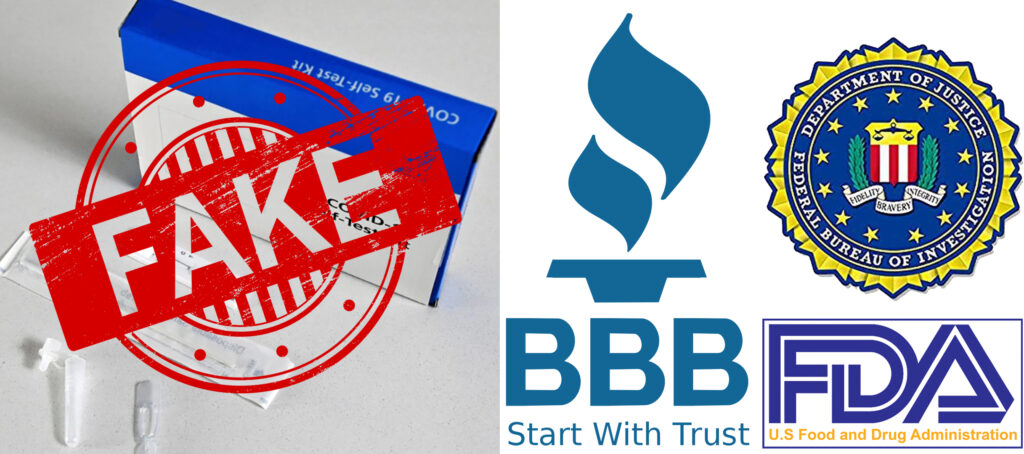
By Better Business Bureau
The US Food and Drug Administration is warning people of fraudulent coronavirus tests, vaccines, and treatments as the pandemic continues. According to the Centers for Disease Control, since the arrival of the Omicron variant, the increase of testing for COVID-19 has become a concern. Scarcity often leads to potential scams for a product that doesn’t exist, the compromise of personal identifiable information, or the increase of deceptive advertising.
The Federal Bureau of Investigation (FBI) issued a warning last year about potential fraud related to the antibody tests. Scammers are selling unapproved COVID-19 antibody tests, which can give inaccurate results. In doing so, they are also collecting personal information, such as Social Security numbers and dates of birth. They may also be stealing health insurance or Medicare information that can be used in future schemes.
How the scam works
Robocalls are sent out to consumers directing them to a website that looks like a clinic or medical supply company offering COVID-19 tests. These tests allegedly identify if a person has been infected with coronavirus – even if they’ve recovered. Some even promise results in 10 minutes. However, to receive a test, a credit card or a form needs to be completed with personal information.
In some cases, the test involves an easy at-home testing kit. Other times, the tests are allegedly offered through a clinic. But in all versions, the person or website selling the test is short on details. They aren’t willing or able to provide any information about how the test works, where it is sourced, and what laboratory processes it.
Don’t fall for it! These tests are not US Food and Drug Administration approved and will not give accurate results. In fact, requestors may never even receive an actual test kit. Either way, scammers will have made off with the money and personal information.
In a new twist, Newsweek reports that scammers appeared at a testing site in Florida and conducted fake tests to people standing in line, as a ruse to get their personal information.
How to avoid fake coronavirus tests and related scams
For More Information
BBB has additional tips for avoiding scams on BBB.org/spotascam and the BBB news feed.
If you’ve been the victim of a scam, please report it on the BBB.org/ScamTracker. Your report can help others to stay alert and avoid similar scams.

Source: Supervisor Diane Burgis

Contra Costa County District 3 Supervisor Diane Burgis. Official photo.
The spread of the omicron COVID-19 variant after the holidays has caused widespread demand for COVID testing kits. CVS and Walgreens are now limiting how many at-home tests customers can buy.
The lack of availability is prompting Contra Costa County Supervisors to take action.
This week, Supervisor Diane Burgis’ office is distributing at-home test kits for free to those who have struggled to find them. The test kits will be distributed on a first-come-first-served basis.
Due to the high demand, we are limiting the test kits to two per family (four tests – each kit contains two tests). We will continue to distribute the COVID-19 test kits as long as supplies last.
Burgis has distributed thousands of COVID tests so far, delivering to local businesses, restaurants, and churches in District 3, and is hoping the supply from the county’s health services can keep up with the demand.
District 3 is working with the City of Oakley to help distribute the at-home test kits at a drive-through event at the Oakley Recreation Center on O’Hara Ave., the event will be held Thursday, January 6, 2022, from 1-4 pm (or while the supply of test kits lasts).
Free At-Home COVID Test Kits – Drive Through Event
Oakley Recreation Center
Thursday, January 6, 2022
1:00PM – 4:00PM

With negative COVID-19 test
Starting Thursday, Contra Costa County will align with state guidance and CDC guidance issued on Dec. 27, that recommends shorter isolation and quarantine periods for people infected with or exposed to COVID-19.
Under the state guidance, anyone who tests positive for COVID-19, regardless of vaccination status, can end their isolation period after five days if they subsequently test negative and don’t have symptoms or their symptoms are improving. The test must be done on or after day 5 of isolation. Previously, the isolation period for positive cases was 10 days.
Quarantine periods for people exposed to someone with COVID-19 have also been shortened to five days under certain circumstances. For unvaccinated people and those not up-to-date on their COVID vaccinations (eligible for a booster but haven’t gotten one), quarantine can end after day 5 with a negative test.
People who have gotten a booster shot or are up-to-date on their COVID vaccinations—meaning they’re fully vaccinated but not yet eligible for a booster — do not have to quarantine following an exposure. However, they should get tested 5 days after they were exposed to be safe.
Over-the-counter antigen tests can be used to end isolation and quarantine. Even if people test out of quarantine or isolation, they should wear a well-fitting mask around others for a total of 10 days, especially in indoor settings.
People unable to get tested during quarantine or isolation should remain at home for up to 10 days.
These state guidelines are for the general public and not healthcare workers, who have their own isolation and quarantine guidance. K-12 students and workers should also check with their schools and employers about requirements for returning to school or work since state guidance may differ for those settings.
“The state’s new guidelines for the community strike a good balance between protecting public health while minimizing disruptions to our essential workforce,” said Dr. Ori Tzvieli, deputy health officer for Contra Costa County. “Aligning with the state guidelines also minimizes confusion so there aren’t different rules in Contra Costa than what is being recommended by the California Department of Public Health.”
The County will be rescinding its previous local isolation and quarantine orders and aligning with the state’s isolation-and-quarantine guidance starting Thursday, Jan.6 at 12:01 a.m.
Allen Payton contributed to this report.

By Allen Payton
On Monday, Dec. 27, 2021, Contra Costa County Health Officer, Dr. Chris Farnitano issued another order mandating county first responders and workers in homeless shelters to verify they have received a booster dose of vaccine or a weekly negative COVID test.
Contra Costa Health Services claims it’s being done, “to better protect the county’s health system from becoming overwhelmed by the highly contagious omicron variant of COVID-19.”
This requirement applies within the county to law enforcement officers, firefighters and emergency medical personnel who work in or may respond to emergency calls at high-risk facilities such as hospitals, jails, nursing or congregate care facilities, as well as all workers in homeless shelters. It also applies to non-emergency ambulance workers who provide medical transport for such facilities.
The order, which takes effect on January 10, requires unboosted workers to test weekly with either a PCR or antigen test for COVID-19.
Yet, the CDC issued a Lab Alert on their website on July 21, 2021, that “After December 31, 2021, CDC will withdraw the request to the U.S. Food and Drug Administration (FDA) for Emergency Use Authorization (EUA) of the CDC 2019-Novel Coronavirus (2019-nCoV) Real-Time RT-PCR Diagnostic Panel, the assay first introduced in February 2020 for detection of SARS-CoV-2 only.”
In addition, the FDA posted on their website the CDC’s Real-Time RT-PCR Diagnostic Panel, dated that same day, which reported the tests do not necessarily work. It reads, “Positive results are indicative of active infection with SARS-CoV-2 but do not rule out bacterial infection or co-infection with other viruses. The agent detected may not be the definite cause of disease. Laboratories within the United States and its territories are required to report all results to the appropriate public health authorities. Negative results do not preclude SARS-CoV-2 infection and should not be used as the sole basis for treatment or other patient management decisions. Negative results must be combined with clinical observations, patient history, and epidemiological information.”
CDC 2019 Novel Coronavirus (nCoV) Real-Time RT-PCR Diagnostic Panel – Instructions for Use (fda.gov)
“The omicron variant is much more infectious than previous strains of COVID-19,” said Farnitano. “Boosting is necessary for the best protection from omicron infection and transmission. Our hospitals are at risk of being overwhelmed if a large number of our must vulnerable residents get sick. Our goal is to ramp up the protection around places where there is an elevated risk of exposure, and people who are at high risk of serious illness if they become infected.”
However, as previously reported, according to reports from throughout the U.S. and internationally, symptoms have been described as mild, and “extremely mild” by Dr. Angelique Coetzee, the South African doctor who first discovered and announced the new strain.
The order requires applicable workers to test weekly for COVID-19 and provide the results to their employers, or if fully vaccinated, provide proof that they have received a booster dose of COVID-19 vaccine within one month of becoming eligible. Employers are required to keep vaccination records for these employees.
Anyone 16 or older is eligible for a booster dose six months after they become fully vaccinated with the Pfizer or Moderna vaccines, or two months after they receive a dose of the Johnson & Johnson (Janssen) vaccine.
On Dec. 22, California added a similar statewide requirement for healthcare workers, home care workers, and employees of congregate care and detention facilities.
Omicron is already the dominant strain of COVID-19 in the U.S. The average daily number of newly detected COVID-19 cases in the county has risen about 156% in the past week with an average of 313 new cases per day, a trend expected to continue and potentially accelerate throughout California this winter.
Contra Costa identified the county’s first patients infected by this variant last week – two of the three initial cases were fully vaccinated, but none of them had received booster doses.
According to the Health Services announcement, about 36% of Contra Costa residents aged 16 and older have received a booster dose, which they claim reduces risk of infection from the omicron variant and dramatically reduces risk of serious illness, hospitalization or death from all variants of COVID-19.
Farnitano was asked specifics about his new health order including, “how many of the newly detected cases of COVID-19 in our county are from the omicron variant?” and “how many people who have been diagnosed with the omicron variant in our county been hospitalized?”
In addition, he was asked, “why mandate a COVID-19 vaccine booster dose for county first responders and workers in homeless shelters when both the vaccines and boosters are proving not to work, since people who have had both of them are still contracting COVID?”
Farnitano was also asked, isn’t this an unnecessary overreaction to the omicron variant, since the symptoms are being reported as mild.? He was then asked, with more than 1.3 million reported adverse reactions to the COVID-19 vaccines, why continue to mandate them and the boosters, putting first responders at risk, especially since the symptoms of the omicron variant are so mild?”
The unelected county health officer, whose orders can’t be overruled by the elected county supervisors, was asked, why he was including the PCR test as one of the mandate options when they have proven to give false reports and have been discontinued as of Dec. 31.
Finally, Farnitano was asked “are you not aware the FDA posted on their website the CDC’s Real-Time RT-PCR Diagnostic Panel dated that same day, which reported the tests do not necessarily work which is the reason the CDC discontinued their use?”
Dr. Farnitano didn’t respond. Instead, Will Harper, a spokesman for the county Health Services did, but he didn’t answer all the questions.
“Over the past two weeks, a growing number of lab samples in CoCo being sequenced are omicron,” Harper wrote in an email Wednesday afternoon. “We expect omicron to become the predominant variant in the county very soon. Check back in after the holidays.”
“Clearly, Omicron is extremely contagious as we see cases in Europe and parts of the U.S. spiking. While there are indications omicron is more mild than earlier strains, we don’t know that for sure. Even if it is milder, the sheer volume of cases from omicron could still have major impacts on our healthcare system,” he continued. “In Contra Costa, hospitalizations are up 39% from two weeks ago — a troubling sign, although still manageable right now.”
“The vaccines work — but we’re learning that their effectiveness wanes over time, which is why it’s so important for everyone ages 16 and older to get their booster shot, especially people in high-risk settings like first responders,” Harper added. “You can see on our vaccine dashboard that people who’ve gotten boosters have lower case rates.”
Additional questions were sent Wednesday night after work hours, asking, “but if the COVID vaccines wane in just months, while vaccines we received as kids, such as for smallpox, chickenpox and polio, etc. last a lifetime, how can anyone claim the COVID vaccines work? Or were they designed and developed with obsolescence so people would be required to get booster shots? What happens when the booster shots wane? Will people be required to get another, and another? When will it end?”
The text of the order is available at cchealth.org/coronavirus.
Please check back for any updates to this report.